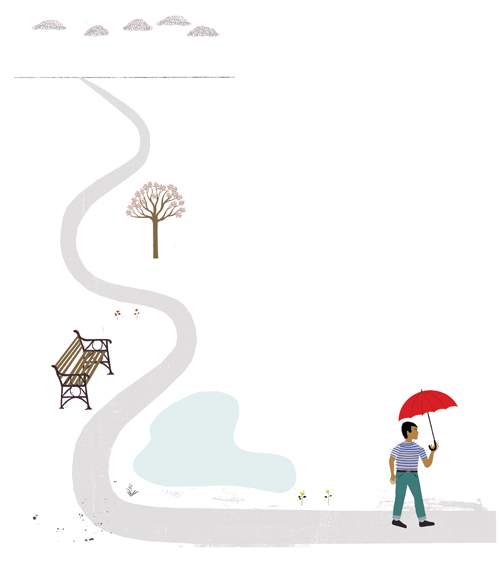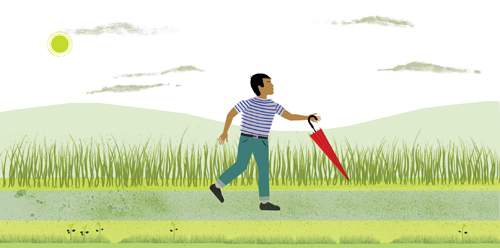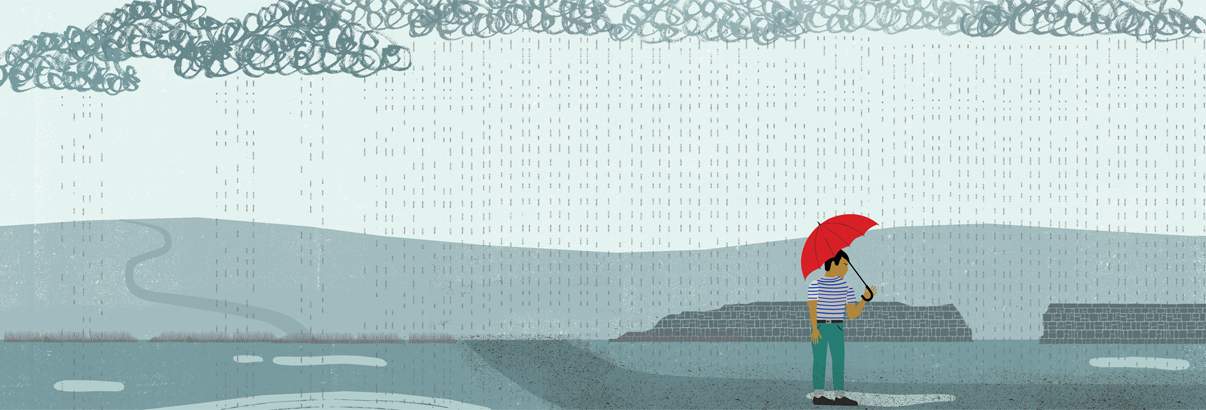Mindful recommends that anyone with depression or mood disorders consult a mental health professional before beginning or altering any course of treatment. Our articles do not constitute professional medical advice for your precise circumstances.
“Depression is not a disease,” says Dr. James Gordon in his book Unstuck: Your Guide to the Seven-Stage Journey Out of Depression. “It is a sign that our lives are out of balance, that we’re stuck. It’s a wake-up call and the start of a journey that can help us become whole and happy, a journey that can change and transform our lives.”
For anyone who has experienced depression firsthand, this view may come as a surprise—and a relief. For anyone who’s had a doctor hand over a drug prescription at the slightest sign of the blues, Gordon’s take may seem like heresy.
And it’s about time.
Depression ranks as the “most disabling of nonfatal conditions in the United States and around the world,” according to Gordon. It is, he says, “the defining disorder of our times.”
The statistics in Unstuck underscore the point. One in five Americans will have an episode of either major depression or dysthymia (defined as a “disordered and depressed mood”) during their lifetime. More than 13 million Americans will have a major episode of depression this year, and countless others will experience symptoms that don’t quite reach the threshold for clinical diagnosis. Depression makes people more likely to suffer from a host of other problems, such as heart disease, alcoholism, and diabetes. The annual cost of lost productivity is more than $50 billion a year.
Increasingly, the most common way to treat depression of any kind is by prescribing pharmaceuticals. Gordon sees antidepressants as a reasonable—and sometimes necessary—last resort, if no other treatments are found to help. But, he argues, drugs are by no means the place to start.
Gordon takes a more positive and empowering look at depression, but this is no Pollyanna approach. Depression can be serious, so do consult a doctor. But also take the time to consult yourself. If you are navigating any level of depression, you may be feeling miserable and disoriented, but, in Gordon’s words, “that doesn’t mean you don’t have intuition. People have a sense of what’s right for themselves.”
As for the rest of the journey, there’s no magic bullet. Personal effort is required. Whether Gordon is counseling patients or training other health care practitioners to take a more mindful approach, it’s the active involvement of tuning in to your body, exercising and eating well, and digging more deeply into the bigger questions of life that is called for. And on the other side of that journey? There lies the possibility of living a more enriched life with greater resilience, health, appreciation, and balance.
Mindful sat down to talk about the Unstuck approach with Gordon, who is the founder and director of The Center for Mind-Body Medicine in Washington, D.C. He’s a graduate of Harvard Medical School and a clinical professor in the departments of psychiatry and family medicine at the Georgetown University School of Medicine.
The hallmarks of depression are hopelessness and helplessness. My approach is grounded in hope and helping people help themselves.
Mindful: Why do you think it’s a bad idea to define depression as a disease?
James Gordon: When you’re in the midst of depression, you don’t know where your life is going, you’re feeling unhappy and pessimistic, and you don’t feel like interacting with others. When you’re trying to navigate that kind of condition, I don’t think it serves you best for someone to describe that as a disease.
Mindful: Why not?
JG: First of all, it’s inaccurate, because depression doesn’t have a regular pathological set of symptoms or signs. They differ from person to person. The broader implication is that this is something that needs to be treated, almost always with medication. When we call depression a disease, we define it as something chronic and essentially out of the realm of one’s own understanding. We treat it as an enemy. In that view, depression is something to reject and suppress, rather than a situation where we have the possibility of learning what’s going wrong in our lives and how to put our lives back into balance.

Mindful: What kind of imbalance are we talking about?
JG: It may be physical, emotional, mental, conceptual, social, spiritual, or all of them at the same time. They’re all connected, so the idea is to look at the ways you’re not in balance at this moment. When I work with a patient, I know that sooner or later I will need to address all of these dimensions. Each is part of who we are, and they have a profound effect on each other.
Mindful: Can you give an example of being out of balance?
JG: Say you feel an overwhelming yearning for a man or woman who’s left your life. You can’t stop thinking about him or her—you’re totally focused on that person. That’s understandable, but it’s also a kind of imbalance. You have already set up the script, so you’ve got to watch your mind—watch how it’s creating that kind of imbalance.
Mindful: What are some first steps to regain balance?
JG: Healing is based on hope, connection, and taking a more meditative approach to our lives. It starts with knowing you can make a difference in how you feel and how you live.
Recovery happens in small ways. Feeling connected to your body is important. When you move your body—even if you can only walk a few blocks—you generally feel a little better. It helps to appreciate the things you do have, even while grieving what you’ve lost. Beginning a meditative practice can help you gain some perspective. That’s important because the more perspective you have regarding your imbalances, the less they can throw you out of balance.
Overall, the course of treatment that makes the most sense, for both ordinary unhappiness and clinical depression, brings together a variety of methods. So psychological work can be combined with, among others, physical exercise, guided imagery, artistic expression, yoga, nutrition, acupuncture, and spiritual and meditative practices.
Every one of these methods has proven benefits. They improve mood in a significant number of people—and without side effects or deadening people’s emotions. An integrative approach that carefully combines these various methods to meet a patient’s individual needs is likely to produce better results than drugs, and with less physical and emotional downside.
Mindful: When you say “meditative practice,” what do you mean?
JG: Watch your mind work. Watch it thinking that, as in the earlier example, you’re never going to have another relationship. When you pay attention like that, you’re no longer so overwhelmed by that thought and therefore less out of balance. It’s a step-by-step process in which meditation and mindfulness help you observe what’s going on and relax with it. The point is that the more we’re relaxed and in the present, the less anxious and less depressed we’re going to be.
Depression can be the dead hand of the past. Our longing for what we’re missing has a hold on us. If we feel helpless about our situation and don’t feel we can change it, we are likely to remain depressed. If we can mobilize our feelings of hopefulness, if we see that hope is justified and act on it, then our mood will improve. As we learn to express our feelings, make a commitment to helping ourselves, and reach out to others, we are already on our way.
There’s little evidence that anti-depressants are more helpful than other approaches. In fact, a number of studies show that they’re only a little more effective than placebos.
Mindful: Your book, Unstuck: Your Guide to the Seven-Stage Journey out of Depression, encourages people to be fully engaged in working their way out of depression—with help, but fully engaged.
JG: The hallmarks of depression are hopelessness and helplessness. I want my approach to be grounded in hope and help people to help themselves. The key is to be persistent—to have patience with yourself. I tell potential patients, “You’re going to have to do 80% to 90% of the work yourself.” I’ll be here with you, but I can’t do it for you.
If someone wants to be a patient of mine, the first thing I do is talk to them on the phone. I want them to understand who I am and how we will work together. Most of all, I want them to feel that they are no longer helpless, that together we can move them out of their depression.
I don’t offer magic bullets, so it’s important to see that there’s a good fit between what the patient wants and what I can offer. Sometimes people will say to me, “I don’t want to look at what’s going on inside myself. I just want a pill to make it better.” I understand that. But unfortunately for most people, there is no pill that can make it better in that simple way. Often, what seems to be better turns out to be very incomplete. I don’t know how many people have said to me, “Well, I don’t feel so bad since I’ve been on the medication. But I don’t feel much of anything either.”
Mindful: We don’t go for long processes these days.
JG: Well, you either treat depression as a disease to be suppressed or you treat it as a painful opportunity to grow and change. What I’ve observed over the past 40 years or so is that if you treat it the second way, it most often becomes exactly that: an opportunity for growth and change. If you treat it the first way, maybe people won’t feel quite as much pain, but they don’t usually make the kinds of changes they may need to put their lives on a firmer footing.
Patients often feel diminished by taking medications. They think, “Oh, there’s something wrong with me. My doctor says I have a chronic disease and I have to be on these drugs forever.” Depression comes to be thought of almost like insulin-dependent diabetes, and with that comes a kind of resignation. But it’s not like insulin-dependent diabetes at all. There’s no evidence that people do better if they’re on the drugs for long periods of time. There’s actually little evidence that antidepressants are more helpful than other approaches. In fact, a number of studies show that they’re only a little more effective than placebos.
So we’re making people dependent on medication, and we’re foreclosing possibilities for learning and change. To me, the use of medication is only a last resort. If the pain is unbearable, and nothing else works, then okay.
Mindful: We somehow think that life isn’t supposed to be difficult?
JG: That’s true. We’re supposed to be able to function well and cheerfully under any circumstances. We’re not supposed to feel the pain that is inevitably there in life. The approach is: let’s not look at it. Let’s suppress it. It’s more like being mind-less.
Mindful: So how did we get here?
JG: One factor is that the economic incentives in the health care system favor talking to people less and giving them medication more. Just as the economic incentives push obstetricians into doing more Cesarean sections than are needed, many psychiatrists see more people less frequently, for less time, for more money.
The way it happened was that as depression came to be defined more and more as a disease, pharmaceutical companies saw an opportunity and began heavily marketing drugs they called antidepressants. Insurers and HMOs then certified depression as a drug-treatable disease. The other approach was psychotherapy, but that was a much longer and more expensive process, and the outcome was hard to prove statistically. So to save money, the health care industry offered incentives for drug treatment and cut back benefits for psychotherapy and other so-called “talking cures.”
The other factor is an eroding respect for the process of introspection. Issues related to mental and spiritual health are often the lowest priority in health care, even though they may actually be the most important thing. I think that’s beginning to change now, aided significantly by increased medical interest in meditation. Among its many other benefits, meditation is a way to bring back the kind of self-awareness that psychotherapy was supposed to promote.
Mental and spiritual health is often the lowest priority in health care, even though it may actually be the most important thing.
Mindful: Can you talk a bit about your work training health care practitioners?
JG: We’re not trying to make professionals more knowledgeable about the psychopathology of other people—there are plenty of other places to do that. We’re training them to be more mindful about their own reactions, their own responses, their own challenges. That’s our major work, whether people come to us as patients, clients, students, or clinicians we’re training. It puts more emphasis on intuition, on relaxation, and on awareness and less on cognitive problem solving.
Mindful: Why is it important for health care practitioners to learn these techniques?
JG: Some people say, “I just want to learn these mind-body techniques and the science behind them. I wasn’t planning to come here and work on myself.” But if you’re not doing it yourself, you can’t use it with other people. That’s because it’s not about a pill. It’s an approach, a basic grammar of human functioning to maintain and improve the quality of our lives.
Mindful: Back to the idea of balance: I really like the way you talk about balance as an active state. We don’t “get there”; we’re working at it all the time.
JG: That’s really important, because people are looking for something to fix them forever, and that is not a terribly helpful concept. Balance is a way of being that you gradually learn, that you sometimes forget and have to remind yourself of. Being part of a group can be enormously helpful. If you’re depressed, having a group where you can practice these techniques of self-care and share your experiences and challenges with other people in a safe, meditative place is enormously helpful.
Of course, using self-care techniques and mutual help doesn’t mean you can’t do individual therapy or biofeedback or take medication, but it will help maximize the effectiveness of whatever else you’re using. And sometimes it will let you know that what you’ve been doing maybe isn’t what you should be doing. That’s because you need to keep discovering what’s right for you, which changes over time. The technique that was great a year ago may not be the best one right now. It’s a good idea to look at that. Ideally, you could have somebody who’s helping you—in a disinterested, impartial way—figure out what makes the most sense. If something works, fantastic! But if it stops working, let it go.

Finding Our Light:James Gordon’s seven stages for the journey through depression.
If you flee from and suppress the symptoms of depression—with drugs and/or denial—you run the risk of remaining stuck in self-defeating and repetitive patterns, in habits and ideas and ways of relating to others that no longer serve you. If you see and embrace each stage of the journey as your teacher—an opportunity to see what you’ve been ignoring and need to know—powerful change and healing can and will come.
1. The Call
The awareness that we are depressed and that some kind of change, a journey, is necessary.
2. Guides on the Journey
Meeting and choosing the men and women who can help, and developing our own inner guidance and wisdom.
3. The Surrender to Change
Allowing and encouraging ourselves to let go of what constrains and freezes us and to move into the current of life.
4. Dealing with Demons
Meeting the challenges—self-doubt, loneliness, procrastination, pride, resentment, perfectionism, fear—and finding in them the unique daimon, the source of our own meaning, purpose, and direction.
5. The Dark Night of the Soul
Allowing and inviting the deepest life-giving freedom to emerge as we move through the despair that may come to any of us.
6. Spirituality: The Blessing
Experiencing the unity and peace, the love and generosity, the connection to something or someone greater than ourselves that can transform our lives.
7. The Return
Learning to live every day joyously, deeply, consciously, with ourselves and others, in the light of what we have experienced and are always learning.








